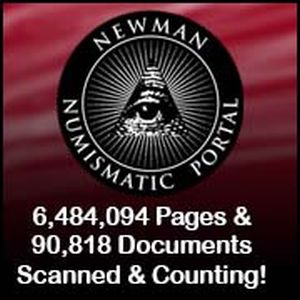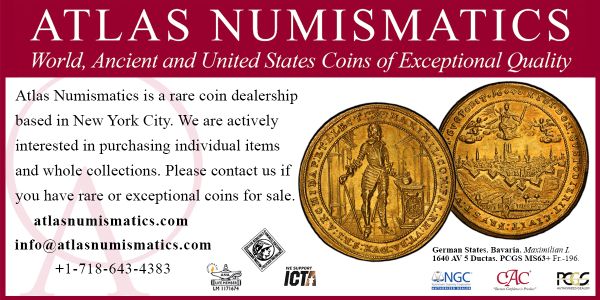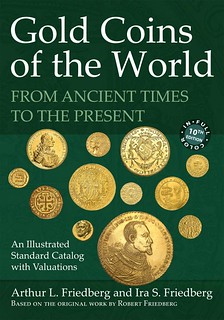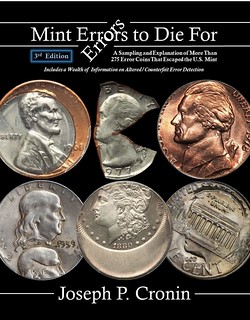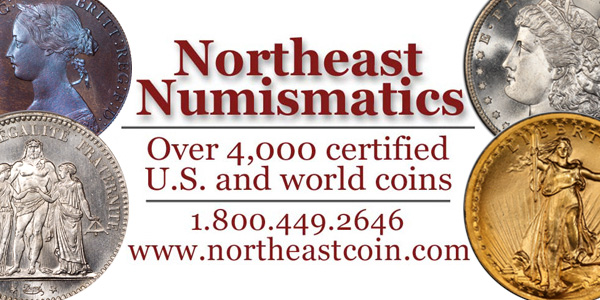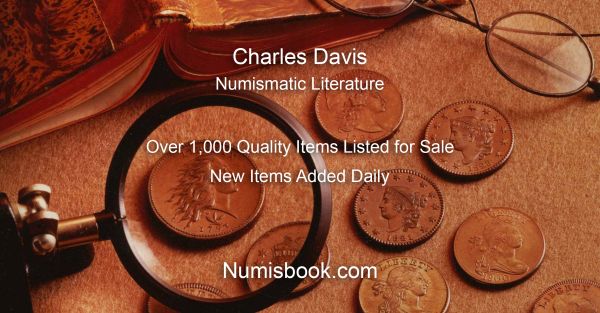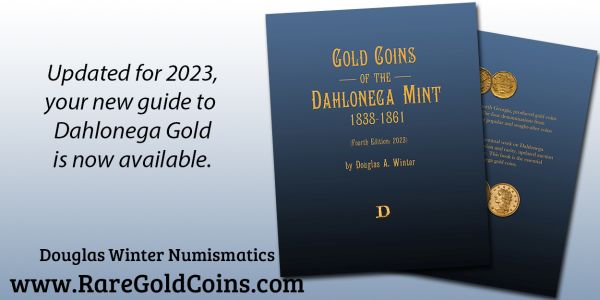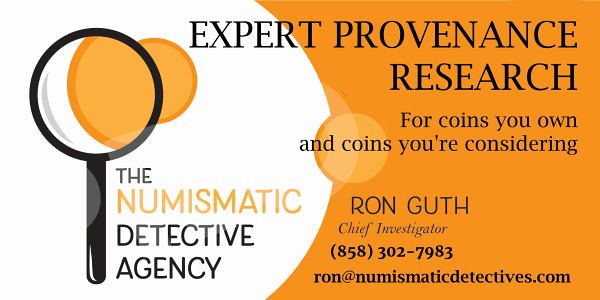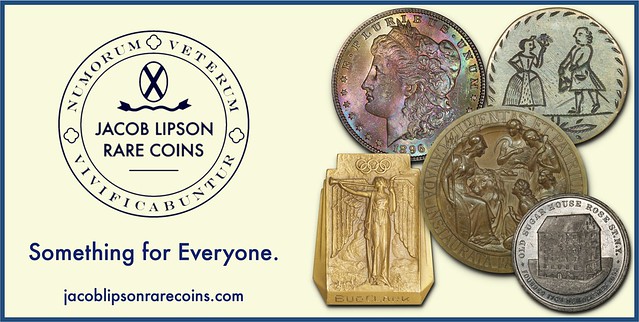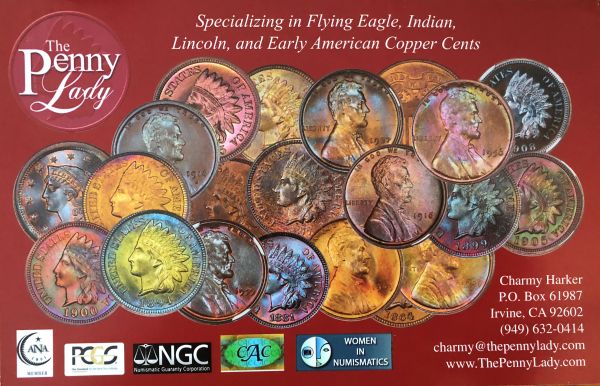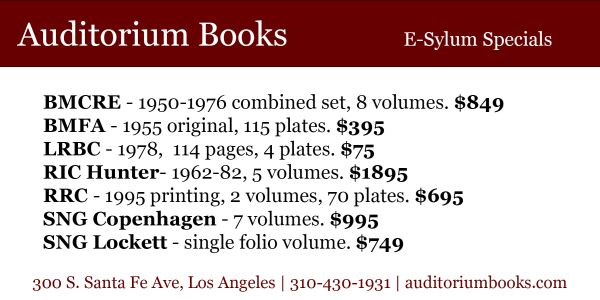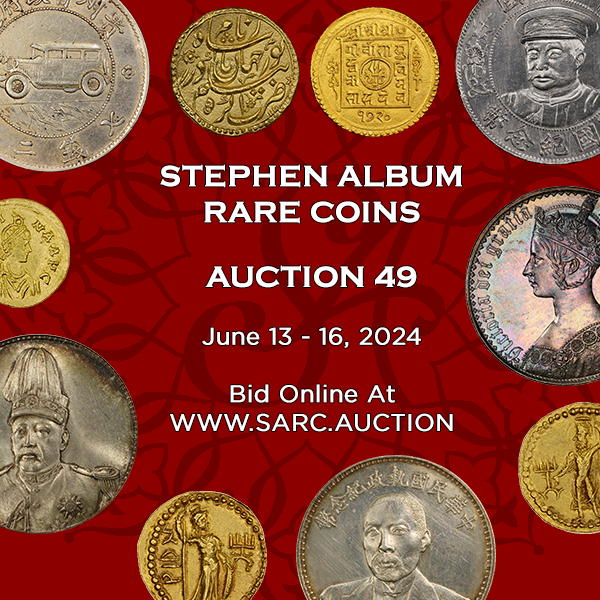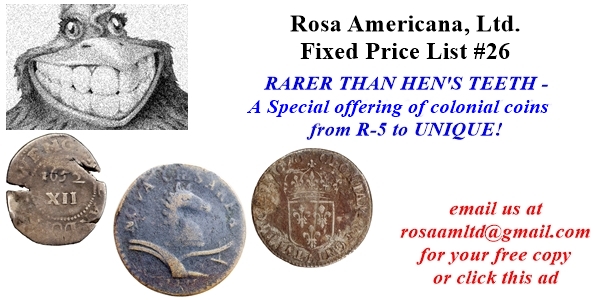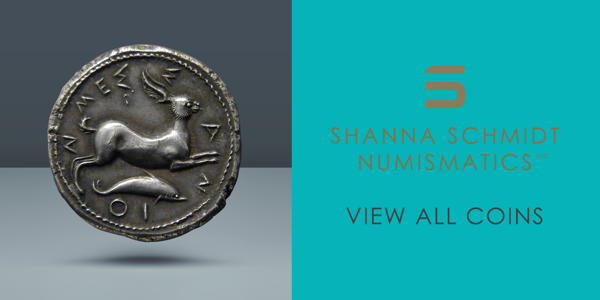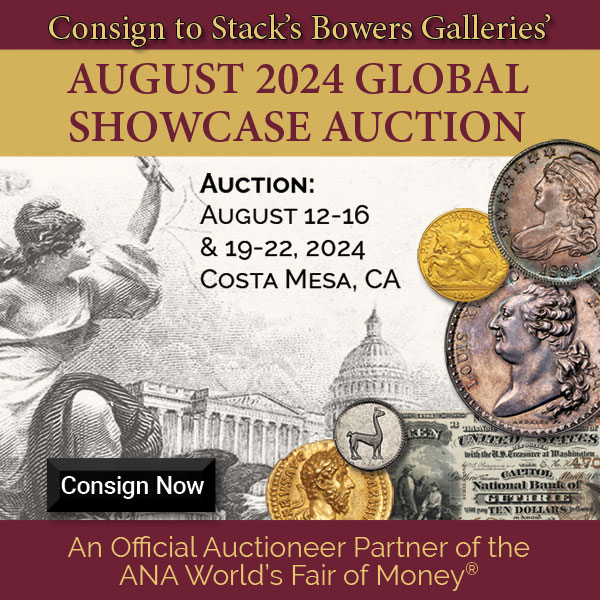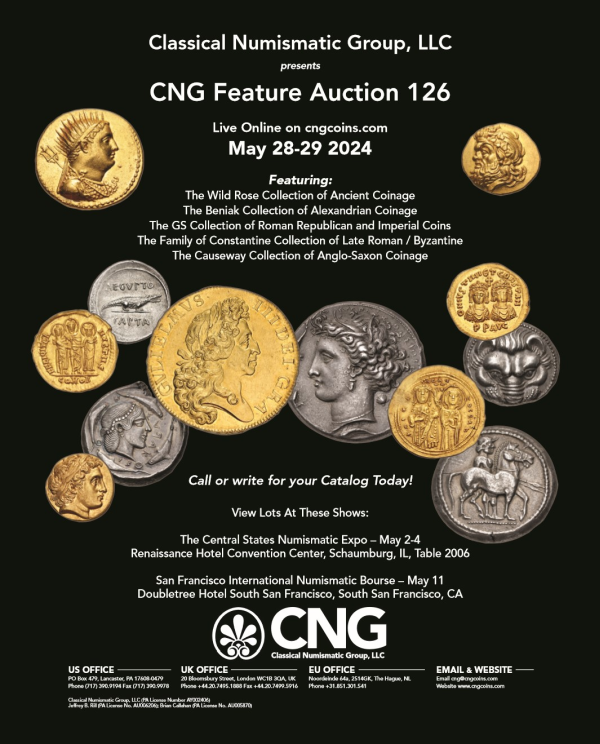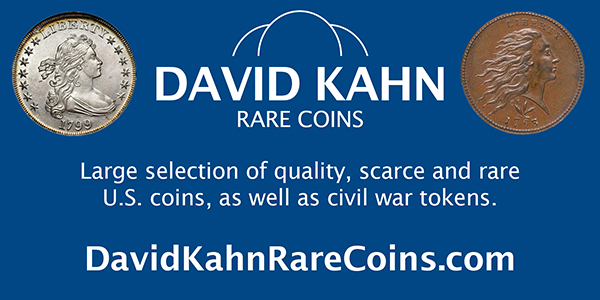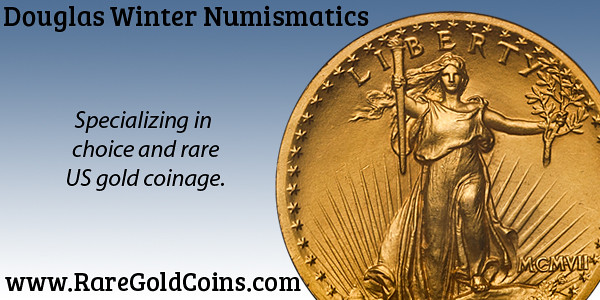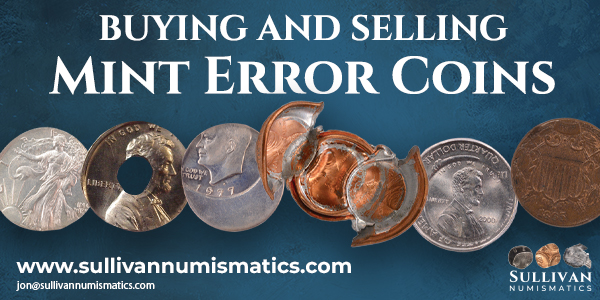
Visit our NBS Sponsors



About UsThe Numismatic Bibliomania Society is a non-profit association devoted to the study and enjoyment of numismatic literature. For more information please see our web site at coinbooks.org SubscriptionsThose wishing to become new E-Sylum subscribers (or wishing to Unsubscribe) can go to the following web page link MembershipThere is a membership application available on the web site Membership Application To join, print the application and return it with your check to the address printed on the application. Print/Digital membership is $40 to addresses in the U.S., and $60 elsewhere. A digital-only membership is available for $25. For those without web access, write to: Jeff Dickerson, Treasurer AsylumFor Asylum mailing address changes and other membership questions, contact Jeff at this email address: treasurer@coinbooks.org SubmissionsTo submit items for publication in The E-Sylum, write to the Editor at this address: whomren@gmail.com BUY THE BOOK BEFORE THE COIN |
- WAYNE'S WORDS: THE E-SYLUM MAY 19, 2024
- GARRETT ZISS TO ASSIST E-SYLUM EDITOR
- KOLBE & FANNING RETAIL WEBSITE UPDATE
- NEW BOOK: JESELSOHN COLLECTION, VOLUME I
- BOOK REVIEW: AMERICAN MILITARY BUTTONS
- DAVID NORMAND REDDEN (1949-2024)
- ERIC BROTHERS ON THE SACAGAWEA DOLLAR
- VIDEO: QDB ON GREAT COIN COLLECTORS
- ELWIN CRAMER LESLIE PHOTOS FOUND
- REVISITING NUMI, PART TWO
- NOTES FROM E-SYLUM READERS: MAY 19, 2024
- THE GREAT KENTUCKY DRAMATIZATION
- VOCABULARY TERM: PLASTER CAST
- JAMES CHARLES RISK (1913-2005)
- HOBBY HEROES HONORED AT CSNS
- ANA READING ROOM MAGAZINE NOW FREE
- SAM GELBERD JOINS CCAC
- NUMISMAGRAM MEDAL SELECTIONS: MAY 19, 2024
- ARCHIVES INTERNATIONAL MAY 22, 2024 SALE
- SOVEREIGN RARITIES AUCTION XIII
- TREVOR WILKIN COLLECTION OF SIEGE NOTES
- THE BRUUN COLLECTION GETS COVERAGE
- NUMISMATIC NUGGETS: MAY 19, 2024
- GIRL SCOUT EARNS MEDAL OF HONOR
- DID BANK'S ATM DISPENSE A FAKE $100 BILL?
- OHIO RESTROOM FINDS: $37,000 IN CASH
- DONALD AND ERA FARNSWORTH DOLLARS
Content presented in The E-Sylum is not necessarily researched or independently fact-checked, and views expressed do not necessarily represent those of the Numismatic Bibliomania Society.
WAYNE'S WORDS: THE E-SYLUM MAY 19, 2024
 Thank you for reading The E-Sylum. If you enjoy it, please send me the email addresses of friends you think may enjoy it as well and I'll send them a subscription. Contact me at whomren@gmail.com anytime regarding your subscription, or questions, comments or suggestions about our content.
Thank you for reading The E-Sylum. If you enjoy it, please send me the email addresses of friends you think may enjoy it as well and I'll send them a subscription. Contact me at whomren@gmail.com anytime regarding your subscription, or questions, comments or suggestions about our content.
This week we open with an E-Sylum announcement, numismatic literature offerings, one new book, a book review, updates from the Newman Numismatic Portal, notes from readers, and more.
Other topics this week include American Military Buttons, the Sacagawea dollar, great coin collectors, the Great Kentucky Hoard, plaster casts, Jim Risk, Sam Gelberd, fixed price and auction selections, and the Farnsworth dollars.
To learn more about Garrett Ziss, David Redden, Charles Pletz, George Mills, Coins of the Holy Land, holed coins, Whitsun Farthings, Siege Notes, other Bruun collection sales, and piles of cash found in Ohio restrooms, read on. Have a great week, everyone!
Wayne Homren
Editor, The E-Sylum
GARRETT ZISS TO ASSIST E-SYLUM EDITOR
The number one question readers have for me as editor is "How the heck do you manage to publish so much information every week?" Sometimes I wonder myself. I've gotten pretty efficient over the years, but it's still a lot of effort. While Bruce Perdue handles all the website work and sends out the email, the editing and formatting of articles are done by yours truly. Or were until two weeks ago, when our sponsor the Numismatic Bibliomania Society brought on Garrett Ziss to assist for two or three hours per issue. He's been doing a great job pulling together and formatting articles. It's great to have a helper and backup. Time to make it official - welcome aboard, Garrett! -Editor
Garrett Ziss Becomes Assistant to E-Sylum Editor
 Garrett Ziss, American Numismatic Association Young Numismatist of the Year for 2020, is now assisting E-Sylum Editor Wayne Homren. Ziss is well-known in numismatic circles and has contributed original research to the John Reich Journal and other publications. Garrett has conducted oral history interviews for the John Reich Collectors Society and Liberty Seated Collectors Club, and has delivered presentations at many events including the Newman Numismatic Portal Symposium. He also served as a summer intern for the Portal in 2021.
Garrett Ziss, American Numismatic Association Young Numismatist of the Year for 2020, is now assisting E-Sylum Editor Wayne Homren. Ziss is well-known in numismatic circles and has contributed original research to the John Reich Journal and other publications. Garrett has conducted oral history interviews for the John Reich Collectors Society and Liberty Seated Collectors Club, and has delivered presentations at many events including the Newman Numismatic Portal Symposium. He also served as a summer intern for the Portal in 2021.
Garrett is a numismatic collector and researcher and has been a member of the NBS for nine years. His numismatic library has been assembled over the years to support his collecting and research interests and focuses on American paper money as well as early U.S. silver and copper coins. It contains several items with a meaningful numismatic pedigree, including literature previously owned by esteemed numismatists Eric Newman, Jules Reiver, Henry Hilgard, Kirk Gorman and Lester Merkin (bookplate shown below).
Garrett is a Senior Honors student at the University of Pittsburgh pursuing dual Bachelor of Science degrees in Business Administration (Business Information Systems, Analytics) and Economics. His interest in economics was sparked by his research on American obsolete paper money and the prominent role these notes played in keeping the country’s commerce moving during times of economic hardship.
KOLBE & FANNING RETAIL WEBSITE UPDATE
Kolbe & Fanning recently updated their website with a number of great new and used titles. -Editor
Kolbe & Fanning Numismatic Booksellers have been adding to their online inventory at their retail website, numislit.com. Featuring some 1000 titles, the Kolbe & Fanning site includes recently published books as well as second-hand volumes, with items spanning the entire range of numismatic subjects and ranging from $10 to $3500. We carry a variety of new publications from such publishers as Whitman, CNG, Spink, the ANS, Varesi, and Gadoury, including many titles we import to make available to our customers. A few new publications include:
NEW BOOK: JESELSOHN COLLECTION, VOLUME I
Haim Gitler of The Israel Museum, Jerusalem has published the first in a planned series of volumes based on the Jeselsohn Collection of Coins of the Holy Land. Volume I covers Hacksilber and Persian and Early Hellenistic coinage. -Editor
THE JESELSOHN COLLECTION OF COINS OF THE HOLY LAND
Volume I - PERSIAN AND EARLY HELLENISTIC COINAGE
The book contains a catalogue of the largest collection of early coinages minted locally in the southern Levant during the fifth-fourth centuries BCE. The two centuries of Achaemenid dominion in the Near East, from 538 until 332 BCE, constitute a crucial period in the history of the southern part of the Fifth Persian Satrapy, also known as “Beyond the River” (‘Abar Naharâ). This period is marked by a profound transformation in the economic, political and cultural life of the region.
From the mid-fifth century BCE we witness a transition in the means of payment from the use of weighed metal (mostly silver) to that of foreign coinage, and, subsequently, to local issues. The issuing of local coins by civic minting authorities should be seen as a part of a longer process of monetization by which the use of precious metals in various shapes for economic transactions was transformed into the use of coins for such transactions in the southern Levant.
The current volume, covers the Persian and Early Hellenistic Coinage, i.e. from the Persian (Achaemenid) and early Hellenistic (Ptolemaic and Seleucid) periods, roughly 450 to 250 BCE, as well as three Hacksilber and jewelry hoards and varia. This includes the coinage of Philistia, Samaria, Judah and possibly Dor and Edom.
BOOK REVIEW: AMERICAN MILITARY BUTTONS
Tom Kays submitted this review of a new book about American Military Buttons, which have many parallels to the design, manufacture, and heraldry found on early U.S. coins, patriotic tokens, seals, medals, and currency. Thank you! -Editor
by Bruce Bazelon and William Leigh
 Early American coin designers sought ways to depict the unique American character through tiny patriotic icons and legends on tiny disks of metal that would clearly invoke the ideals of “Liberty,” “Freedom,” and “States United.” Private token makers would likewise imitate early federal coin designs to make small disks with patriotic-themed advertising intentionally resembling coins.
Early American coin designers sought ways to depict the unique American character through tiny patriotic icons and legends on tiny disks of metal that would clearly invoke the ideals of “Liberty,” “Freedom,” and “States United.” Private token makers would likewise imitate early federal coin designs to make small disks with patriotic-themed advertising intentionally resembling coins.
Yet, another group of manufacturers faced these same design challenges as coin and token makers. America’s first military uniform buttons were flat, one-piece buttons about the size of a large cent that needed to distinguish all branches of federal military service, state militias, and civilian government officials. These too hold patriotic obverse designs like coins, but with a shank attached on the reverse, often surrounded by the manufacturer’s advertising like tokens.
A new guide to these fascinating hybrid bits of early American identity is available in American Military Buttons – An Interpretive Study – The Early Years 1785 – 1835, by Bruce Bazelon and William Leigh, Woonsocket Rhode Island, Mowbray Publishing, 2024. Nicely illustrated in color, are 224 pages with images of thousands of rare American uniform buttons gathered from many lifetime collections including the U.S. Army Center of Military History. Historic buttons are identified and interpreted with the work dedicated to The Society of American Buttonists. The authors present new information to trace the development of American patriotic heraldry through button types, manufacturers, and attributions from the end of the Revolution to 1835. This is an on-going project with the authors welcoming reports of new discoveries to be added to the text.
THE BOOK BAZARRE
DAVID NORMAND REDDEN (1949-2024)
Auctioneer David Redden of Sotheby’s has died. Along his career he auctioned what were at the time the most expensive coins, medals and stamps in the world. Born January 23, 1949, he passed on May 11, 2024 at the age of 75. -Editor
David Redden, a towering figure in Sotheby’s history – and in the lore of auctioneering more broadly – has died at age 75 of viral pneumonia. But what a life he lived.
He joined Sotheby’s in the mid-1970s and, in a career spanning more than 40 years, rose to the rank of vice chairman and became one of the house’s longest-serving auctioneers. He sold a staggering variety of objects, both at auction and by private sales.
He sold the Magna Carta. He sold Earth’s first spaceship. He sold James Naismith’s founding rules of basketball. Three copies of the Declaration of Independence. Sue the dinosaur. Gilbert Stuart's lifesize portrait of George Washington. The collection of Jacqueline Kennedy Onassis. At one point, the vault next to his office contained both Faberge Imperial Eggs from the legendary Forbes Collection and the papers of Martin Luther King, Jr.
ERIC BROTHERS ON THE SACAGAWEA DOLLAR
The latest addition to the Newman Numismatic Portal is the Spring 2024 issue of Financial History. Project Coordinator Len Augsburger provided the following report. -Editor
Eric Brothers on the Sacagawea Dollar
 The journal of the Museum of American Finance, Financial History often contains articles of numismatic interest. The recent spring 2024 issue includes a contribution from Eric Brothers on the Sacagawea dollar, first issued by the U.S. Mint in 2000. This coin attracts little attention in the U.S. but is widely circulated in Ecuador, as Brothers explains. This writer can attest to receiving in change a well-worn “golden dollar” during a recent trip to that country.
The journal of the Museum of American Finance, Financial History often contains articles of numismatic interest. The recent spring 2024 issue includes a contribution from Eric Brothers on the Sacagawea dollar, first issued by the U.S. Mint in 2000. This coin attracts little attention in the U.S. but is widely circulated in Ecuador, as Brothers explains. This writer can attest to receiving in change a well-worn “golden dollar” during a recent trip to that country.
Brothers covers the legislative history of the coin and the development of the coin design. The “golden” description created confusion among the public, which in some cases truly believed their examples contained gold, while the Cheerios and Walmart promotions created their own controversies.
VIDEO: QDB ON GREAT COIN COLLECTORS
The David Lisot Video Library on the Newman Numismatic Portal can be found at:
https://nnp.wustl.edu/library/multimediadetail/522852
We highlight one of his videos each week in The E-Sylum. Here's one from 2005 with Dave Bowers speaking about America's greatest collectors. -Editor
ELWIN CRAMER LESLIE PHOTOS FOUND
A couple weeks ago Adrian Gonzalez Salinas asked for a photo of author Elwin Cramer Leslie (1909-1999). Julia Casey has answered the call - and promptly too, although I didn't manage to get this note into our last issue. Sorry for the delay. -Editor
Regarding Adrian Gonzalez Salinas’s request for a photo of Elwin Cramer Leslie, attached are scans from the 1928 Lakewood (Ohio) High School Cinema yearbook. I also located a detailed article from the Sunday, March 8, 1959, Cleveland Plain Dealer, “Persistently Yours: Skilled Hands Still Wield Pen Despite Trend,” which included a photo of Elwin Leslie. The article is about Leslie’s penmanship partnership with Michael G. Cunningham. Cunningham and Leslie were described as “engrossers and illuminators.”
After Elwin Leslie’s father, Scott E. Leslie, was killed in a car crash in 1941, details of his life were reported in the national newspapers. The August 22, 1941, New York Times wrote that Scott E. Leslie was a “handwriting expert who helped terminate a number of criminal careers” and that “he was an expert in all kinds of writing, in ink chemistry, the age of writing paper, and in the types of writing employed at different periods of many countries.” The elder Leslie’s expertise was used in the Lindbergh kidnapping case and an important voting fraud investigation. He was able to show that a number of X’s on multiple ballots were written by the same hand.
REVISITING NUMI, PART TWO
Justin Hinh created an app using OpenAI's ChatGPT4 platform to provide coin identification and grading estimates. His April 28 update examined improvements in its grading performance. Following comments by Bill Eckberg, Justin revisited his calculations and submitted this revised report. Thank you! -Editor
How the ChatGPT-4o Model is a Gamechanger and a New Approach to Testing AI Grading
Bill Eckberg's response to my AI coin grading analysis in the April 28th newsletter raised serious points about the nature of coin grading and the need for more comprehensive testing. I had a chance to connect with Bill to understand his thinking better. His insights prompted me to reevaluate my approach to evaluating AI coin grading. I agree with Bill, it does not make sense to say “Numi saw a 32.47% increase in overall accuracy.” The test results should be broken down by each grade.
While reanalyzing my test results to reflect this new approach, OpenAI released ChatGPT-4o on May 13th. Quite a nice surprise!
NOTES FROM E-SYLUM READERS: MAY 19, 2024
More on Charles Pletz
Julia Casey writes:
 "I found a little more information to add to the story of Charles Pletz, the Arizona assayer.
"I found a little more information to add to the story of Charles Pletz, the Arizona assayer.
"The June 22, 1872, Weekly Arizona Miner reported that “Mr. Pletz, Assayer in Cerbat, is making our money: Plenty of silver bars, worth from $6 to $25, and stamped, “Wallapai District,” are in circulation here and money is becoming flush in consequence.”
"Pletz advertised his assaying office - this is from the November 27, 1874, Arizona Miner.
"Later in the 1890s, Pletz advertised as a “Mining Engineer and Metallurgist” under the name Carlos Pletz. He "fell dead" in September 1897 “at the fiesta grounds” after inspecting a mine and was buried in Nogales. After Pletz died, the national press reported that his son, Fred Pletz of San Francisco, was stunned to learn that his father was a wealthy mining man who had left him $50,000."
Thanks. There's always something new to discover in numismatics. -Editor
To read the earlier E-Sylum article, see:
https://www.coinbooks.org/v27/esylum_v27n19a25.html
(https://www.coinbooks.org/v27/esylum_v27n19a25.html)
Other topics this week include engraver George Mills, holed coins, and Whitsun Farthings. -Editor
THE GREAT KENTUCKY DRAMATIZATION
In the well-that-was-a-big-bait-and-switch department, The Great Kentucky Hoard television program teased earlier did not actually show or name the farmer who discovered some 800 gold and silver Civil War-era coins buried in a cornfield. Instead, we got a dramatization with a narrator reading text from an email (supposedly) sent by the finder. We still don't know where the coins were found, who the finder is, what they look or sound like, or if they even exist in the first place.
As noted earlier, I understand why coin hoard finders may wish to remain anonymous, but it always leaves a cloud over the reported story since it could all be just made-up hooey. Still, the second part of the show is at least entertaining and worth watching, and Jeff Garrett discusses his role. -Editor
VOCABULARY TERM: PLASTER CAST
Here's another entry from Dick Johnson's Encyclopedia of Coin and Medal Terminology. I added an image of a Sacagawea dollar obverse plaster cast. -Editor
 Plaster Cast.
An image of any three-dimensional object molded of plaster of Paris. Plaster casts are inexpensive, easy to make, excellent for transferring relief and superb for studying an object's three-dimensionality. With the development of the die-engraving pantograph, plaster casts became the ideal media for which the original bas-relief design could be converted into a die. The artist could either model or carve the plaster itself, or if he worked in any other media, he could make a plaster cast from any firm medium, for a hard plaster cast that could be submitted to a mint or medal manufacturer to be rendered into a die for striking coins or medals.
Plaster Cast.
An image of any three-dimensional object molded of plaster of Paris. Plaster casts are inexpensive, easy to make, excellent for transferring relief and superb for studying an object's three-dimensionality. With the development of the die-engraving pantograph, plaster casts became the ideal media for which the original bas-relief design could be converted into a die. The artist could either model or carve the plaster itself, or if he worked in any other media, he could make a plaster cast from any firm medium, for a hard plaster cast that could be submitted to a mint or medal manufacturer to be rendered into a die for striking coins or medals.
While plaster casts are somewhat hard they have the disadvantage, however, of scratching, chipping or breaking easily, therefore are inherently impermanent. Some plaster casts have lasted for hundreds of years (if kept dry, indoors and dust-free). But while plaster has been worked by artists for two thousand years, British Museum curator Sir George Hill once remarked that no plaster casts of medallic items have been found to have been preserved for more than a few generations.
JAMES CHARLES RISK (1913-2005)
E-Sylum Feature Writer and American Numismatic Biographies author Pete Smith submitted this article on long-time Stack’s staffer Jim Risk. Thanks! -Editor
James C. Risk was an authority on orders and decorations. He was a long-time manager and cataloguer for Stack’s Coin Galleries and editor of their Numismatic Review.
 Risk was born on May 5, 1913, at Forrest Hills, New York. His parents were Frederick J. Risk
(1883-1943) and Katherine W. Grasmuk (1886-1953). Frederick was a representative for the
Mount Airy Knitting Company.
Risk was born on May 5, 1913, at Forrest Hills, New York. His parents were Frederick J. Risk
(1883-1943) and Katherine W. Grasmuk (1886-1953). Frederick was a representative for the
Mount Airy Knitting Company.
Risk graduated cum laude from Dartmouth in 1936. He went to graduate school at Harvard before becoming a teacher at MIT. War interrupted his career and he joined the Navy in 1940 as an ensign. He served as a lieutenant on escort ships Dahlgren and Jeffers crossing the Atlantic. He was there at Sicily for that invasion.
He wrote Administrative History of the US Navy in the Mediterranean which led to an appointment to the Allied Commission on the Democratization Of Italy. While in the diplomatic service, he became friends with Pope Pius XII, King Umberto and the Duke of Wellington.
HOBBY HEROES HONORED AT CSNS
Central States presented its 2024 awards at their recent show. Here's the announcement. -Editor
Six numismatists were honored for their outstanding hobby work during a ceremony at the recent 2024 Central States Numismatic Society (www.CSNS.org) convention in the Chicago suburb of Schaumburg, Illinois.
“Each of these individuals is a hobby hero and deserving of special recognition,” stated CSNS President Mitch Ernst.
ANA READING ROOM MAGAZINE NOW FREE
The ANA's online magazine Reading Room has been opened to the public. Here's the announcement. -Editor
Beginning in early May, the American Numismatic Association (ANA) opened its Reading Room online magazine to the public. Introduced in November 2023, this virtual publication has emerged as a veritable treasure trove, presenting weekly news stories, exclusive op-eds, captivating columns, and features covering various collecting topics for collectors from all walks of life. The offering includes convenient audio files for on-the-go listening and early access sneak peeks from the Association's esteemed publication, The Numismatist.
Over the course of the past seven months, the Reading Room has welcomed nearly 18,000 visitors. While the site's news stories have been publicly accessible since the launch, the Reading Room Exclusives, audio files, and monthly columns and features have been reserved solely for ANA members. Responding to overwhelming demand and reaffirming the ANA's unwavering commitment to spreading numismatic knowledge, these restrictions have been removed from the site, extending access to all.
SAM GELBERD JOINS CCAC
Dennis Tucker writes:
"A quick CCAC update: Sam Gelberd is inheriting my CCAC position as "member specially qualified in numismatics." I've spent eight amazing, productive, and very satisfying years on the Committee, and I'm very happy that Sam is my successor. We've been friends for a long time. He brings to the CCAC sterling professional experience (including at the ANA) as well as an educator's love of numismatics. For years he's been an enthusiastic advocate for the hobby, and a hands-on teacher. He's going to add a lot to the Committee's work as the United States continues toward many exciting and important new coin and medal programs.
"E-Sylum readers who don't already know Sam can read his bio here:
https://www.ccac.gov/aboutUs/bio_SamGelberd.html."
Thank you for your service to the hobby, Dennis! Here's Sam's bio. Great news. -Editor
NUMISMAGRAM MEDAL SELECTIONS: MAY 19, 2024
Numismagram's Jeremy Bostwick sent along these five medals from his most recent upload of new material to his site. For all of the new items, please visit https://www.numismagram.com/inventory. NOTE: the Moses medal has already been sold. -Editor
102585 | GERMANY. Moses/4th Commandment silver Medal. Issued circa 1800-1830. Parabolical series: honor thy father and thy mother (30mm, 8.66 g, 12h). By J. V. Döll for the Loos workshop in Berlin. DU SOLLST VATER UND MUTTER EHREN (thou shall honor thy father and thy mother...), Moses seated right on rocks, holding two tablets representing the Fourth Commandment (in Catholic and Lutheran tradition) // AUF DASS DIR'S WOHL GEHE (...so that thou art well), cornucopia overflowing with coins and jewels atop table with basket of fruits. Edge: Plain. Sommer B-19; Bruhn 85; GPH 1145. PCGS SP-64. Incredibly brilliant and mirrored, with some alluring iridescence spread throughout. Tied with just one other example for the top spot in the PCGS census, though that example is rather inferior given its lack of color and noticeable hairlines. $345.
To read the complete item description, see:
102585 | GERMANY. Moses/4th Commandment silver Medal.
(https://www.numismagram.com/product-page/102585)
ARCHIVES INTERNATIONAL MAY 22, 2024 SALE
Here are some selected lots in the Archives International sale closing May 22. 2024. -Editor
Afghanistan, Baccha-i-Saqao, PMG graded Choice Uncirculated 64, SH1307 (1928) (Pick-13), Green with red and light brown underprint, back is green; S/N 86249 Block 82, handstamp on Afghanistan #10. Rarely seen this nice.
SOVEREIGN RARITIES AUCTION XIII
Here's the announcement for the upcoming Sovereign Rarities Auction 13. Nice coins. -Editor
Taking place on Wednesday 29th May, the auction offers a wealth of numismatic rarities, from a superb collection of ancient coins, to modern proof issues bearing the popular Una and the Lion design.
The auction is online now on our website www.sovr.co.uk for your perusal, and also features on Numis24, Numisbids, Biddr and The Saleroom. The auction will be held live in our Mayfair office on the 29th May and will commence at 10:30am BST.
The auction will start with the fantastic group of ancient coins, many of which are certified and graded by NGC. Of particular note is the very pleasing Calabria, Tarentum silver Stater which has been awarded MS 4/5, 4/5 designation by NGC (lot 4). Moving to Sicily, Akragas, we are pleased to offer a Tetradrachm and a Didrachm, both of which feature the highly popular eagle / crab motifs (lots 6 & 7). From Gela we are offering a fantastic Didrachm dated to c. 490-475 BC which features the man-headed bull reverse (lot 8), and from Himera, there is another coin following the animal theme as it features the cockerel / crab design. It is a stunning example of this type (lot 9). From Phoenicia we are also pleased to present a silver Half Shekel (lot 21).
TREVOR WILKIN COLLECTION OF SIEGE NOTES
The Trevor Wilkin Collection of Siege Notes will be offered at an auction by Noonans in London on May 30. Here's the Foreword by the catalogers. -Editor
 When Thomasina and I first began our careers in this wonderful hobby, well over a decade ago, Trevor was one of the first people to introduce himself at the Maastricht show. He would always take the time to chat, asking about us and what we were doing, and to offer his help and advice. His superb talks on a variety of subjects were always informative and memorable. For my part, I particularly enjoyed our many conversations about his siege note collection.
When Thomasina and I first began our careers in this wonderful hobby, well over a decade ago, Trevor was one of the first people to introduce himself at the Maastricht show. He would always take the time to chat, asking about us and what we were doing, and to offer his help and advice. His superb talks on a variety of subjects were always informative and memorable. For my part, I particularly enjoyed our many conversations about his siege note collection.
Siege notes are a niche but popular subsidiary of military banknote collecting. All of the notes in this catalogue were produced during incredibly turbulent periods of human history. Most are printed on poor- quality paper never intended for this use, using cheap inks and jury rigged printing machines. The majority were produced and hand signed by men, very often soldiers, who certainly never imagined they would be issuing money simply to keep a town or fortification running during weeks, sometimes months, of desperation. Perhaps most humbling is the fact that many of those who signed the notes did not live to see beyond these sieges.
THE BRUUN COLLECTION GETS COVERAGE
As announced in March, Stack's Bowers Galleries has been selected to auction "the extraordinary coin, medal, banknote, and book collection of Danish industrialist Lars Emil Bruun (1852-1923)." The popular press got wind of the sale this week and a number of articles have appeared about it. Here's an excerpt from a Washington Post piece. -Editor
For more than 100 years, one of the most valuable private collections of coins in the world has been kept out of the public eye. It’s been stowed away in a secret location that almost no one knows — and before that, behind the walls of a castle and in the basement of a bank.
This fall, it will go on sale — and is expected to fetch up to $72 million. It is the most valuable world coin collection to ever come to market, according to Stack’s Bowers, the American rare coin dealer and auction house handling the sale.
The collection of nearly 20,000 coins, medals, bank notes and books was assembled over the course of decades by Danish businessman and butter magnate Lars Emil Bruun.
NUMISMATIC NUGGETS: MAY 19, 2024
Here's a selection of interesting or unusual items I came across in the marketplace this week. Tell us what you think of some of these. -Editor
Vima Kadphises Double Dinar
Kushan Empire, Vima Kadphises (c.113-127), gold Double Dinar, 16.01g, bilingual series, Bactria, bearded bust of king right emerging from jagged mountain top, wearing a high-crowned hat with upturned peak, carrying a club over shoulder, the forefinger of his right hand is enlarged, flames radiate from shoulder right, tamgha in left field, legend around starting at 7 o'clock: bacieyc ooh-mo ka?Fichc, rev. Oesho stands facing, head to left, flames emanating from top of head, ithyphallic and naked except for a diaphanous garment, he holds a trident in his right hand, an animal skin in left, he leans against a bull standing right, nandipada symbol in left field, Kharoshthi legend around: maharajasa rajadirajasa sarvaloga isvarasa mahisvarasa vima kathpisasa tradara (of great king, king of kings, lord of the world, great lord, Vima Kadphises, saviour) (Göbl 12; Jongeward & Cribb 261; Sunrise 524 bust righ, 525 bust left), fine, very rare
From the Spink Numismatic e-Circular 35 Indian and Islamic Coins sale. -Editor
To read the complete lot description, see:
KUSHAN EMPIRE, VIMA KADPHISES (C.113-127), GOLD DOUBLE DINAR, 16.01G, BILINGUAL SERIES, BACTRIA...
(https://live.spink.com/lots/view/4-DMT7HC/kushan-empire-vima-kadphises-c113-127-gold-double-dinar-1601g-bilingual-series-bactria)
Other topics this week include and 1852 Gold Dollar Pattern an M.C. Escher medal, and a Subway Token Brooch. -Editor
GIRL SCOUT EARNS MEDAL OF HONOR
Wow - a Girl Scout who saved the life of a toddler has received the Medal of Honor from the Girl Scouts USA. Congratulations. -Editor
The Girl Scouts of Northeastern New York (GSNENY) recognized Cadette Amelia Juracka from Greenfield Center, NY, who earned the Medal of Honor from the Girl Scouts USA.
She earned the honor for saving the life of a toddler who fell into a swimming pool.
DID BANK'S ATM DISPENSE A FAKE $100 BILL?
Len Augsburger passed along this story of a bank's ATM distributing a counterfeit $100 bill. Thanks. -Editor
A Wells Fargo customer says she’s shocked after the banking giant gave her fake cash during a seemingly routine withdrawal.
Kam Ridley recently went to a Wells Fargo branch in Mississippi to withdraw cash and pay bills, reports the ABC-affiliated news station WAPT.
Ridley then went to her other bank, Trustmark, to deposit the cash – but the ATM refused to accept her $100 bill.
Bewildered, Ridley went inside the bank and spoke to a teller who told her the money from Wells Fargo is obviously fake.
OHIO RESTROOM FINDS: $37,000 IN CASH
Paul Horner passed along this odd story of cash stash finds in Ohio. Thanks. -Editor
A money mystery in Marysville has police trying to figure out where nearly $40,000 came from.
More than $25,000 was found in the restroom at the Avalon Theatre on Saturday, and then, Thursday night, more than $12,000 was found in the restroom at a KFC restaurant on Delaware Avenue.
Investigators said they're pretty sure the discoveries are related, but still don't know where the cash came from.
DONALD AND ERA FARNSWORTH DOLLARS
Gerry Tebben writes:
"A little easter egg is in The Washington Post this weekend. A photo in the story "Book Tour: At home with Amor Towles" has what appears to be a Donald and Era Farnsworth Mona Lisa dollar on a bookshelf in front of a 1931 encyclopedia. The couple uses real bills for their artwork, avoiding the Boggs counterfeiting problem. Sadly, the article makes no mention of the bill, but it's an illuminating look at the author's bookshelf."
To read the complete article, see:
Book Tour: At home with Amor Towles
(https://www.washingtonpost.com/books/interactive/2024/book-tour-home-with-amor-towles/)

